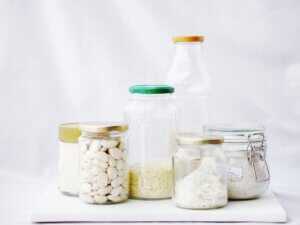Six weeks postpartum isn’t a magic date where all of a sudden you are physically and mentally ready to get it on. In fact, I think we do mothers a disservice by not emphasizing the changes that can occur around intimacy after having a baby.
These can include:
- Physical changes in your body
- Body image issues or feeling self-conscious
- Fatigue
- Feeling touched out
- Hormonal shifts
- Relationship changes
- Mental exhaustion
- Fear of pain/discomfort
- Lack of privacy or childcare (esp. if cosleeping)
At any stage, the best way to start things in the right direction is having open and honest communication with your partner about your fears, desires, expectations, and needs. Postpartum sex shouldn’t be painful and it shouldn’t feel like just another item on your to-do list.
LOW LIBIDO?
It’s totally normal to have a libido that ebbs and flows with your monthly cycle. Pay attention and you’ll notice you’re probably much more interested in sexy time mid-cycle around ovulation thanks to the increases in two hormones – estrogen and testosterone.
Testosterone is traditionally thought of as a male hormone but women have it too and it plays a key role in libido. As estrogen and testosterone peak around day 14 (that differs for every woman), you’ll likely feel a bit friskier.
But what do you do when your libido is MIA and you’ve got nothing, zilch, zip, nada? Not even around ovulation?
Well, first things first, imbalanced hormones and low libido are the consequences of a poor foundation. We have to address the root of the issue – things like nutrition, digestion, minerals, sleep, and stress management if we want to see improvement.
Other things to consider:
- stress
- shame/religious conditioning
- medication side effects
- relationship struggles
- trauma
- pain/discomfort
- dryness
- body image issues
- hormonal birth control
- depression
- poor communication
These are often things that require some additional support and I’m happy to guide you or offer referrals.
FIXING YOUR LIBIDO
I firmly believe that a healthy sex drive is a sign of healthy hormones! I know how devastating it can be to a relationship when your libido takes a nose-dive so when my clients complain of low libido we pay special attention to this as a goal.
More often than not, it requires some deep inner work in addition to the hormonal healing. Here’s the roadmap I use with clients.
You’ve got to:
- Fix your gut
- Address detox and drainage
- Balance your blood sugar
- Eat a nutrient dense diet
- Make time for movement
- Support thyroid, adrenal and sex hormones
- Get off hormonal birth control, learn body/cycle literacy and sync your life with your menstrual cycle
- Address stress and nervous system dysfunction
- Speak loving and kind words to your own body
- Address trauma, beliefs around sex, and relationship health with a qualified counselor or therapist
Lab testing can also be helpful to identify and target your specific root cause. The DUTCH test, is an at-home urine test that can give us information on your levels of progesterone, estrogen, testosterone, cortisol and more. It’s also important to rule out thyroid dysfunction as that can really dampen your drive.
Ready to get to the root of your illusive sex-drive? Schedule a free strategy call HERE.







